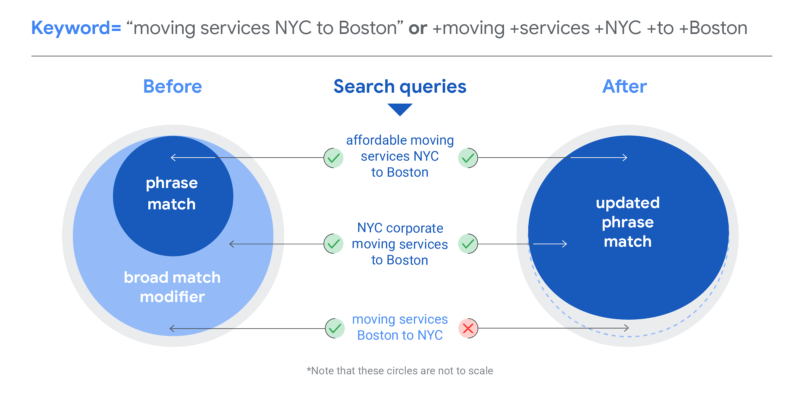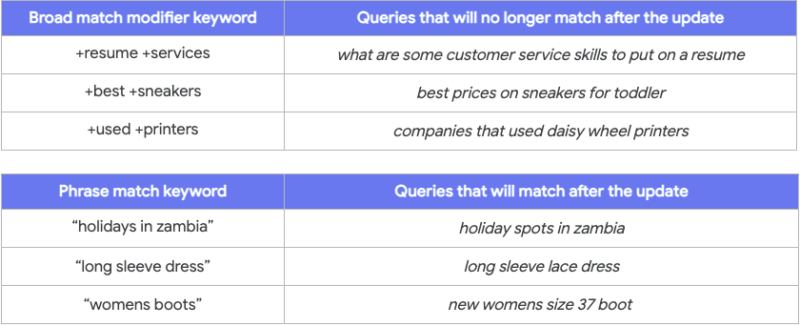Broad Match Modifier is Changing, What Now?
In February 2021 Google announced that they will be changing the matching behavior of broad match modifier in favor of an updated version of phrase match, which began to take place in mid-February. In July 2021, you will no longer be able to create broad match modified keywords but your existing BMM keywords will continue to match to queries in a similar way to the updated phrase match behavior. This announcement stands to be one of the most significant changes to Google Ads since Google ended support of “pure” exact match back in 2014. Read on to learn more about what is happening and what your Google Ads account manager should be doing to prepare for this upcoming change.
Why is Google changing the way these match types work?
Google claims that this change will “make it easier for you to reach your customers, no matter how they’re searching.” This will be possible because their match type system will allow keywords to match to queries with close meaning, rather than a close variation to the keyword like it has in the past. Additionally, the elimination of broad match modifier will mean there will be one less set of keywords to build out for and optimize, reducing management time.
As you may remember, this isn’t the first change Google has made to keyword match types. Here is a full list of changes below:
- 2014 – Google requires all campaigns to opt into using close variants, killing off “pure” exact match.
- 2017 – Google updates close variants to include adjusting for word order and adding function words to matched queries.
- 2018 – Google updates close variants once more to allow exact match keywords to match to intent of query.
- 2019 – Google extends updates to same-meaning variants to phrase and broad match modifier.
- 2021 – Google to retire broad match modifier and lump matching behavior into phrase match.
What will change for phrase match?
Phrase match will continue to exist but will be more important, as it will expand to include the matching behavior of broad match modifier. Google claims that word order will continue to be prioritized, which historically has been phrase match’s main function, but only when it is important to the intent of the search query.
In the diagram from Google below, you will find how phrase and modified broad will look once the change goes into effect.
As you can see, the sample keyword is “moving services NYC to Boston.” With traditional phrase match, it’s necessary that order of the words remain as-is and this keyword would not be a great fit for modified broad as the order could change from “NYC to Boston” to “Boston to NYC” and change the intent of the keyword. Google shows us in the final scenario that with the updated phrase match, this won’t be an issue as Google’s matching behavior will respect word order.
Google provided some additional examples to display how matching behavior will be changing. See below:
What will change for broad match modifier?
Changes to both match types began in February 2021, so it’s important that phrase match keywords are added to all accounts in order not to lose out on queries you’ve been historically matching out to. We are led to believe that BMM terms will have the same matching behavior as the updated phrase match, so there is still time before the July deadline to get your account in order.
The change will be official in July 2021, so advertisers must begin preparation as soon as possible. At that point, we will no longer be able to create broad match modifier keywords and both phrase and modified broad will be officially running with the new matching behavior.
What should you do to prepare for these upcoming changes?
Whether it’s you or your account manager, we recommend that preparation for this change take place as soon as possible. Below we’ve included a list of recommended next steps that should be taken to ensure no hiccups in performance occurs while this change rolls out.
- Monitor search query reports closely over the next several months, specifically look to see if your account continues to match to historically impactful queries.
- If you haven’t already, add phrase match keywords for all your broad match modifier terms in your account (conversion drivers at the very least) as soon as possible. The change to matching behavior will start as soon as this month.
- Consider pausing BMM keywords after enough time has passed and traffic/queries are mostly matching to the phrase match counterpart.
- If you are seeing that your BMM terms are continuing to outperform phrase match terms past July 2021, we suggest leaving BMM terms active as they will leverage the same matching behavior as the updated version of phrase.
- Do not waste your time building out broad match modifier keywords, as they will become redundant come July 2021.
Need help managing your Google Ads and other performance marketing campaigns? Please contact us by email at sales@synapsesem.com or by phone at 781-591-0752.




